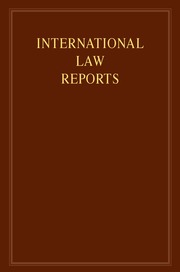Article contents
Prosecutor v. Erdemović (Sentencing Appeal)
Published online by Cambridge University Press: 01 January 2021
Abstract
International criminal law — Crimes against humanity — Nature and definition — Gravity — Sentence — Comparison between crimes against humanity and war crimes — Defences — Duress — Whether duress available as a defence on a charge involving the killing of innocent persons — Massacre of prisoners — Requirements for defence of duress — Serious threat to life and limb — Moral choice — Proportionality — Whether crime would have been committed in any event — Whether duress confined to mitigation of sentence
International tribunals — International Criminal Tribunal for the Former Yugoslavia — Object and purpose — Procedure — Plea of guilty — Whether acceptable — Requirement that plea be voluntary, informed and unambiguous — Plea of guilty not to prejudice fundamental rights of the accused — Differences between International Criminal Tribunal and national courts — Extent of reference to national law — Common law on pleas of guilty — National laws on duress as a defence
Sources of international law — Custom — General principles of law recognized by civilized nations — Nature of reference to national law by international tribunal — Concepts of national law not transplanted in their entirety into international law — Sources of international criminal law
War and armed conflict — War crimes and crimes against humanity — Massacre of large number of prisoners — Criminal responsibility of individuals involved — Whether duress available as a defence — Appropriate sentence
Keywords
- Type
- Case Report
- Information
- Copyright
- © Cambridge University Press 1998
- 1
- Cited by


